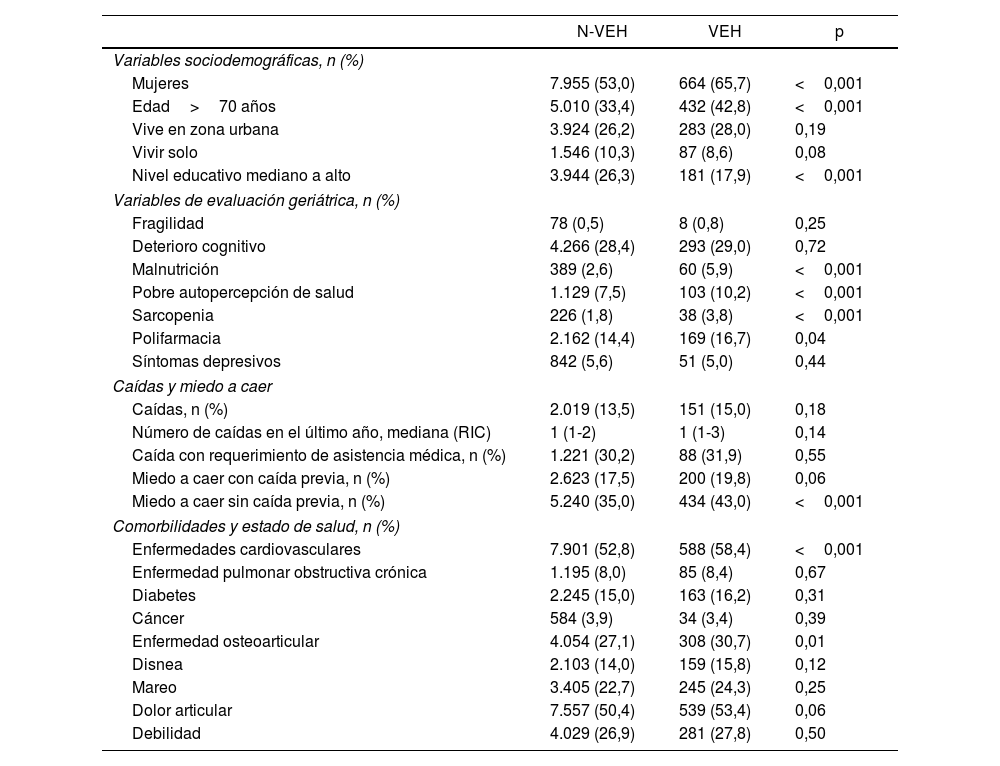El miedo a caer se asocia con deterioro funcional, depresión, ansiedad y peor calidad de vida, encontrándose que tiene mayor prevalencia en personas multimórbidas, con polifarmacia, enfermedad cardiovascular y síntomas afectivos. Nuestro estudio tiene como objetivo evaluar la relación entre el miedo a caer sin haber caído y la vida exclusiva en el hogar en una muestra representativa de ancianos en Colombia.
Materiales y métodosEste es un estudio secundario de la encuesta Salud, Bienestar y Envejecimiento, Colombia. Como variable dependiente se consideró el miedo a caer sin haber caído; como variable de exposición, la vida exclusiva en el hogar. Realizamos un análisis descriptivo y bivariado de la muestra, seguido de un análisis multivariado ajustando por variables de confusión.
ResultadosDe los 16.006 adultos mayores incluidos en el análisis, la edad media fue de 71,4 años y el 53,84% eran mujeres; el 35,44% tenían miedo a caer sin haber caído y el 6,3% tenían vida exclusiva en el hogar. Se realizaron 3 modelos de regresión entre miedo a caer sin haber caído y vida exclusiva en el hogar, el primero ajustado por edad, el segundo por edad, malnutrición, estado de salud autopercibido, sarcopenia y polifarmacia, y el tercero tomando los 2 primeros más enfermedades cardiovasculares y osteoarticulares. El modelo 1 encontró una OR de 1,27 (IC 95% 1,28-1,45) y una p<0,001; y una OR de 1,26 fue encontrada en los modelos 2 y 3 (IC 95% 1,10-1,44), independiente de las otras variables (p<0,001).
ConclusiónExiste asociación entre el miedo a caer sin haber caído y la vida exclusiva en el hogar. Lo anterior proporciona evidencia para incluir esta característica como parámetro complementario en la evaluación de adultos mayores con miedo a caer.
The fear of falling syndrome is usually associated with functional impairment, depression, anxiety, poorer quality of life, and it has also been seen to have a higher prevalence in multimorbid people, those with polypharmacy, cardiovascular disease, and affective symptoms. Our study aims to evaluate the relationship between fear of falling in absence of a history of falls and exclusive life at home on a representative sample of older people in Colombia.
Materials and methodsThis is a secondary study of the Health, Well-being, and Aging Survey in Colombia. The dependent variable considered in this study was the fear of falling without having fallen, while the exposure variable was exclusive homebound living. We conducted a descriptive and bivariate analysis of the sample, followed by a multivariate analysis adjusting for confounding variables.
ResultsAmong the 16,006 older adults included in the analysis, the mean age was 71.4 years, 53.84% were women; 35.44% reported a fear of falling without having experienced a fall, and 6.3% had an exclusive homebound lifestyle. Three regression models were conducted to examine the relationship between the fear of falling without prior falls and exclusive homebound living. The first model was adjusted for age, the second included adjustments for age, malnutrition, self-perceived health status, sarcopenia, and polypharmacy, and the third model incorporated the first 2 adjustments along with cardiovascular and musculoskeletal diseases. Model 1 revealed an OR of 1.27 (95% CI 1.28-1.45) with p<0.001, while Models 2 and 3 both yielded an OR of 1.26 (95% CI 1.10-1.44), independently of the other variables (p<0.001).
ConclusionThere is an association between fear of falling without having fallen and exclusive life at home. The foregoing provides evidence to include this characteristic as a complementary parameter in the evaluation of older adults suffering from fear of falling.








